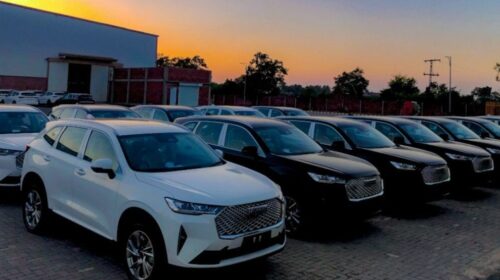Sazgar Engineering Works Limited will roll out the first batch of locally-assembled units of Great Wall Motor’s Haval, the H6 1.5T and 2.0T, this month. The SUVs have been priced at Rs7.425 million and Rs8.499 million, respectively.
A senior official of the company said the new SUV will be competing with KIA Sportage, Hyundai Tucson, Oshaan X7, MG HS and Cherry Tiggo 8 in Pakistan.
“Haval is the number one SUV in China and number three in the world,” Head of Marketing Sazgar Engineering Abuzer Butt told Business Recorder. “Right now, we are starting with two variants, the Haval H6 1.5T and 2.0T. But another variant – the Jolion – can be added in the next few months.”
The company has a capacity to assemble 40 cars a day on a single shift basis, translating to an annual capacity of 15,000 vehicles.
“We started bookings in April and gave a delivery time of November. But we are delivering vehicles at the end of August, despite all the issues. We are three months ahead of schedule and we plan to stay this way,” he claimed.
Sazgar completes manufacturing facilities for Haval, says trial operation to begin July 15
The company’s stock gained 2.73%, and closed at Rs67.47 after the announcement was made towards the end of trading at the Pakistan Stock Exchange (PSX) on Friday.
In its notice, Sazgar confirmed it has completed its trial operation of Haval vehicles “before the stipulated time and first CKD roll-out is expected this month”.
Sazgar Engineering received the government’s green-field status to manufacture Haval SUVs last year.
The company, the largest rickshaw-maker in Pakistan, also exports three-wheelers.
It has also brought another Chinese carmaker, BAIC, to Pakistan. BAIC introduced its D20 vehicle, X25 crossover, and the BJ40-Plus off-roader SUV.
Sazgar brought these two companies under the government’s green-field status. In the auto development policy (ADP-2016-21), the government offered tax incentives to car manufacturers to invest in the sector and receive tax and duty incentives.
The policy attracted a number of auto makers including KIA, Hyundai, MG Motors, Proton, Changan, DFSK and others. However, not all of them have begun local production.
The aim of the policy was to break dominance of the few automakers in the country, while increasing consumer-choice.
The policy did pave the way for new car assemblers to enter Pakistan’s auto fray, however, most of them choose to cater to the high price-tag SUV segment. There are now over a dozen SUVs available to choose from, which is the highest for any segment in Pakistan.
The auto assemblers say they have been responding to anticipated demand patterns in the country. An industry analysis by an auto company suggests that the SUV segment will grab the biggest portion of the auto market in Pakistan with approximately 37% share by 2030 ahead of sedans and hatchbacks.







